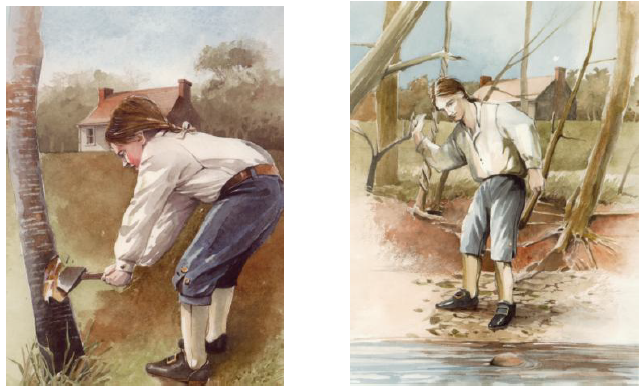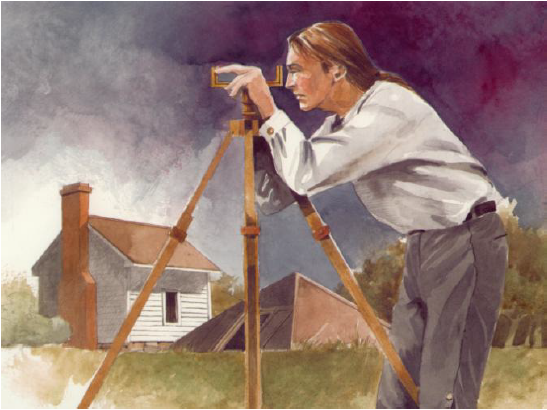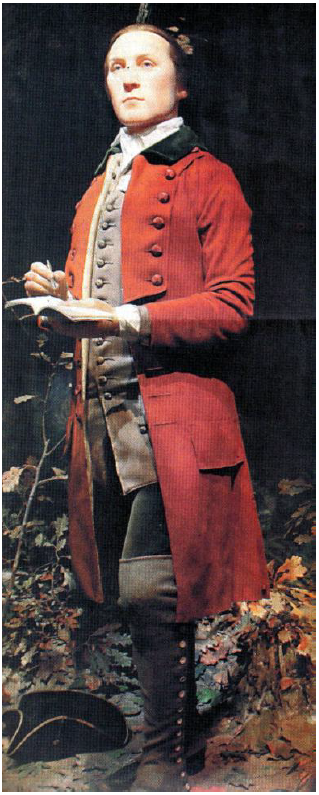George Washington
George Washington was born at his father’s plantation on Pope’s Creek in Westmoreland County, Virginia, on February 22, 1732. His father, Augustine Washington, was a leading planter in the area and also served as a justice of the county court. Augustine’s first wife, Janet Butler, died in 1729, leaving him with two sons, Lawrence and Augustine, Jr., and a daughter, Jane. The elder Augustine then married George’s mother, Mary Ball, in 1731. George was the eldest of Augustine Washington’s and Mary Ball’s six children.
In 1735, when George was three, Augustine moved the family up the Potomac River to another Washington home, Little Hunting Creek Plantation (later renamed Mount Vernon).
In Stafford County, Augustine owned 1,600 acres on which there was a rich deposit of high-quality iron ore. The British-owned Principio Company extracted the ore from the Washington property and smelt it in a cold-blast charcoal furnace. (located behind today’s Colonial Forge High School). Iron ingots were shipped to England, with Augustine receiving money upon their delivery overseas. The furnace was a thriving enterprise from 1726 until 1735 when John England, the manager of the property, died. Problems arose from inadequate management. So in 1738, Augustine, wanting to be closer to the forge, moved his family to a farm on the Rappahannock River, now called Ferry Farm. George lived there from the time his was six until he was twenty years old. It was here that he learned the values and developed the character that would influence the rest of his life.
Very little is known of Washington’s childhood, but it is believed that his early schooling was under Master Hobby, a sexton at the Union Church in Falmouth. Popular fables illustrating his youthful honesty, piety, and physical strength supposedly took place on the farm. The story that Washington threw a silver dollar across the Potomac River — an impossible feat — had its origins in the recollections of a cousin that George could throw a stone across the much narrower Rappahannock River. But others, including the familiar story of Washington and the cherry tree, may have been invented by one of Washington’s first biographers, Mason Locke Weems.

When George was older, he went to formal school in Fredericksburg. He excelled in mathematics and learned the rudiments of surveying. But he was not taught Latin or Greek like many gentlemen’s sons, and he never learned a foreign language. Nor did he attend college. His formal education ended around the age of 15.
When George was eleven years old, Augustine died, leaving most of his property to George’s older half-brothers. Ferry Farm, however, went to George. The income from what remained was just sufficient to maintain Mary Washington and her children on the farm. As the oldest child remaining at home, George undoubtedly helped his mother manage the Rappahannock River farm. It was there he learned the importance of hard work and efficiency.
In 1746, Lawrence proposed that George Washington join the British navy. Although George was excited at the idea of a military career, his mother refused her consent, and George was spared the harsh discipline of a life at sea. Despite missing the opportunity to travel the world, George Washington’s young adulthood became one of the great adventure stories of American history.

Young Washington applied himself to surveying, a valuable skill in a colony where land was being settled constantly. In 1748 he joined a surveying expedition to western Virginia at the invitation of Lawrence’s neighbors, the powerful Fairfax family. The next year the Fairfaxes helped secure him an appointment as a county surveyor. By the age of 17 George was well on his way to a successful and profitable career. In an effort to establish himself as a member of the gentry class, he worked hard, saved his money, and bought unclaimed land.
In 1751 he accompanied Lawrence, who was suffering from tuberculosis, on a voyage to the British island colony of Barbados. Lawrence hoped the tropical air would ease his suffering. While in Barbados, Washington saw some of the most extensive fortifications in British America and socialized with military men, experiences that probably stimulated his interest in military service. He also contracted smallpox.
Lawrence died in 1752, and shortly thereafter George inherited Mount Vernon. He also obtained Lawrence’s place in the Virginia militia and received a major’s commission — the first step in his military career. In 1754, George moved from Ferry Farm to Mount Vernon while his mother, Mary Ball Washington, stayed on at the farm until 1772, when she moved to Fredericksburg.

Washington was inclined to learn from practical experience as a surveyor, militia officer, farmer and regional politician. A member of the Liberty Generation, he opposed tyranny in all its forms. He was a member of the Continental Congress and commanding general of the Continental Army during the American Revolution. After the War, Washington led the Federalist faction, later America’s first political party. He advocated a constitution which formulated a strong national government for finances, defense and foreign policy and was the first President of the United States of America serving two terms from 1789 to 1797.
Washington set enduring precedents for the office of president including the peaceful transfer of power, use of the title “Mr. President” and the two-term tradition. He was eulogized in 1799 by Henry Lee as “First in war, first in peace and first in the hearts of his countrymen” and has been popularly known as the Father of the Country.
